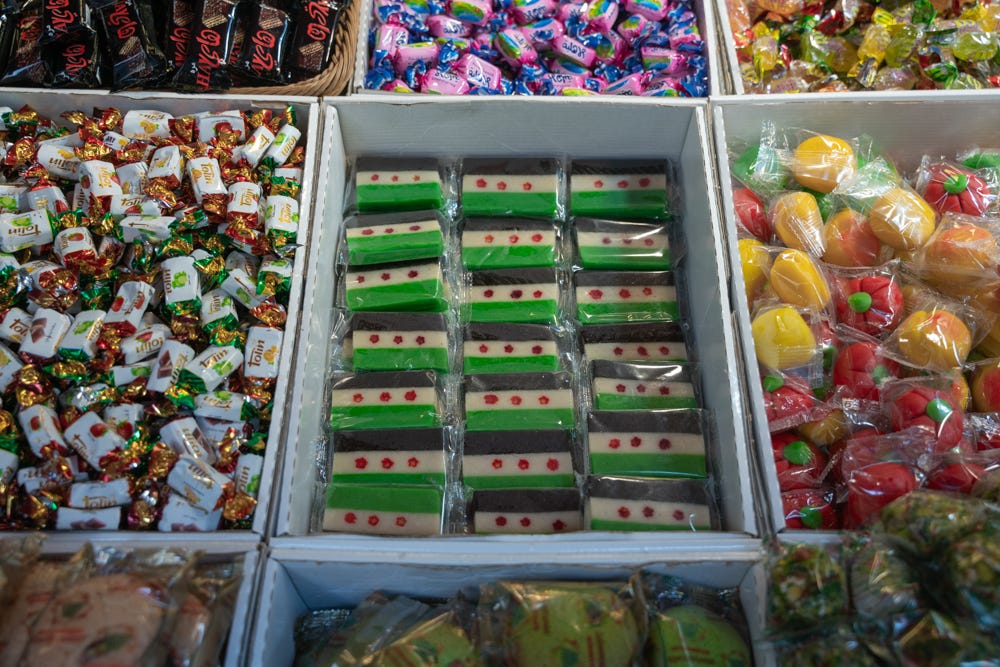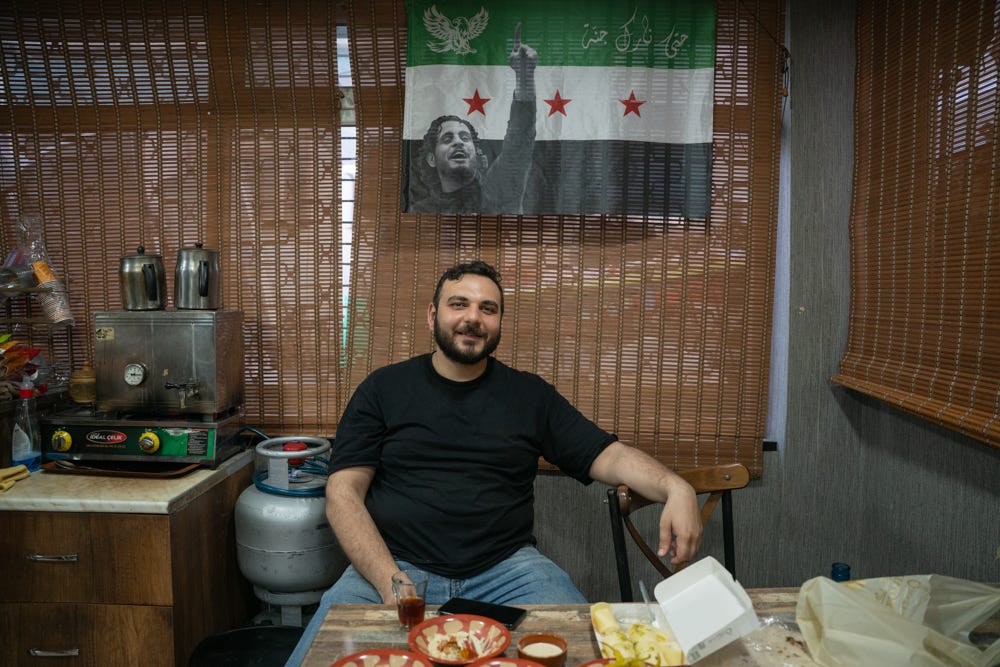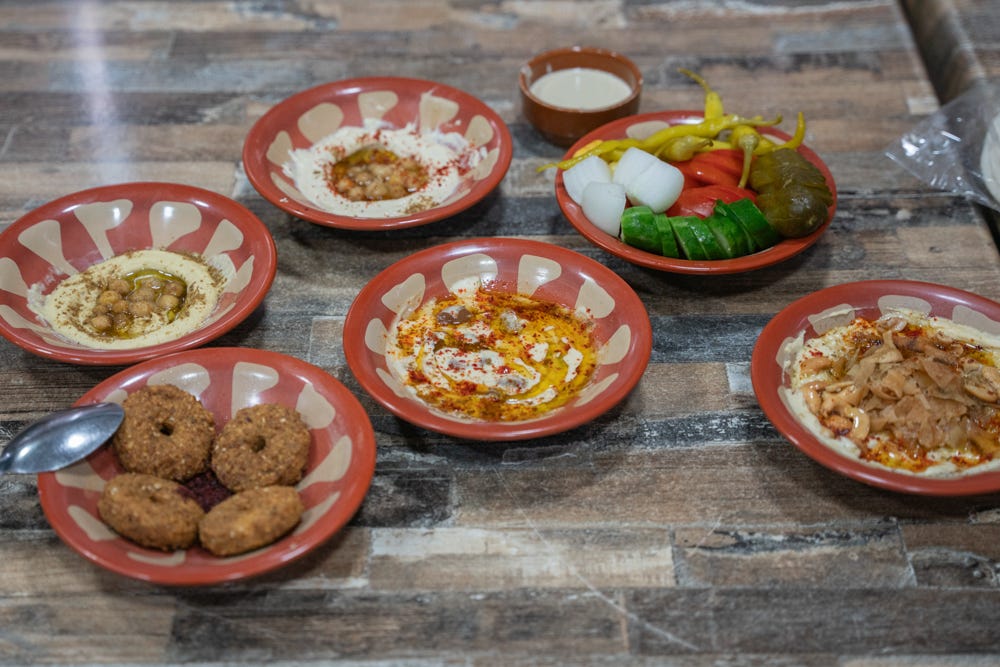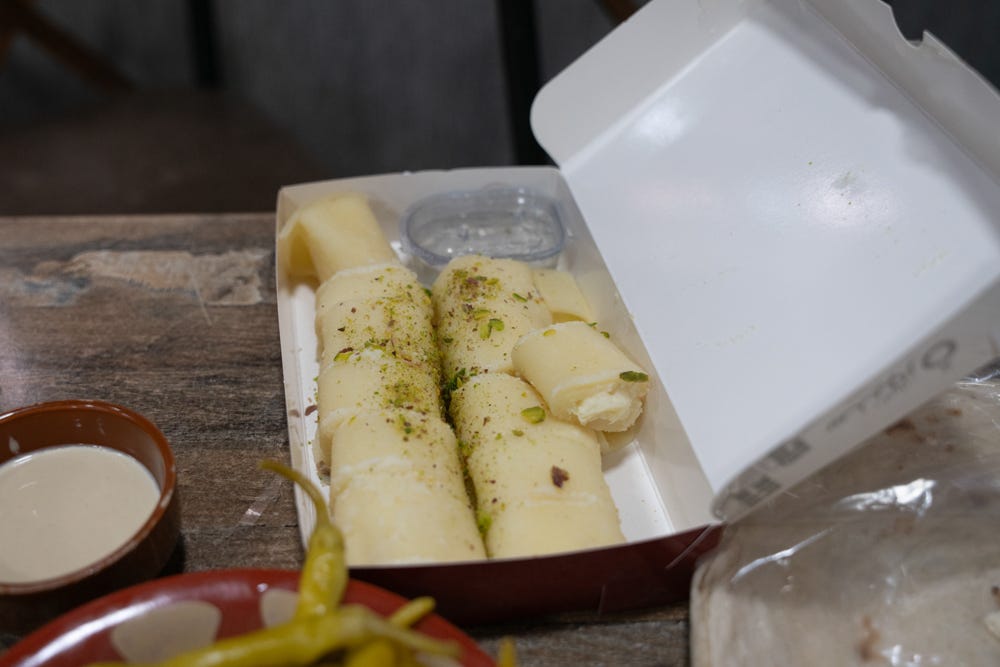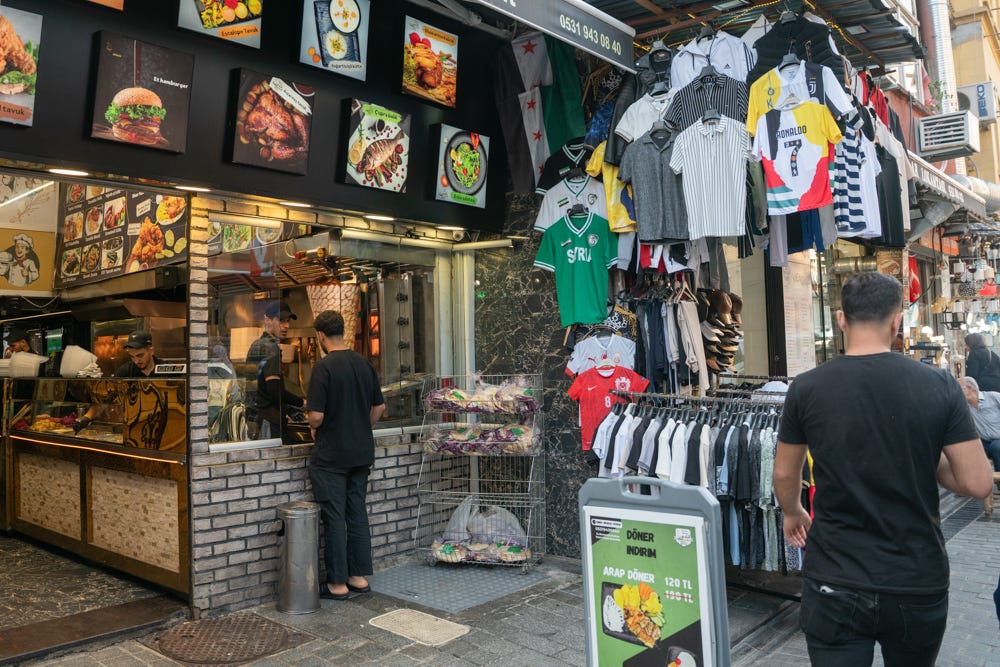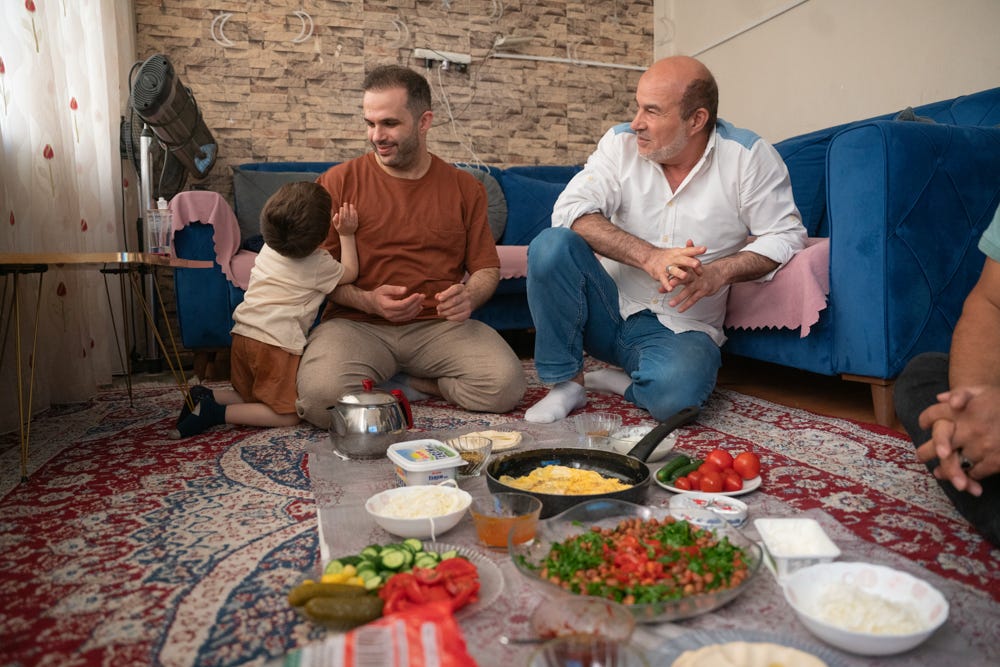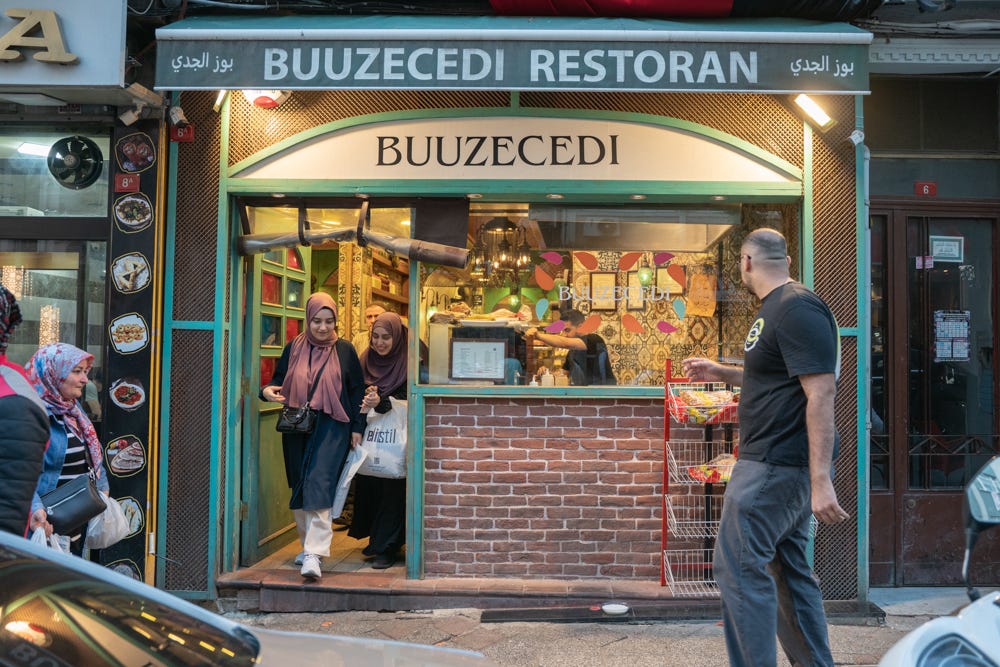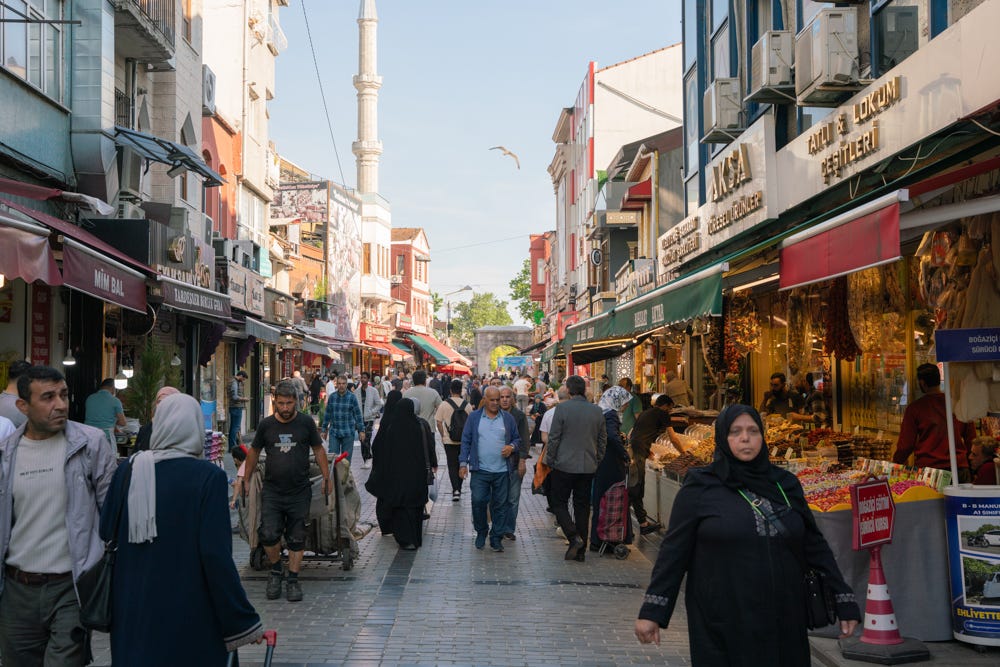ISTANBUL — For years, Syrian chef Syliman Al-Abiad didn’t dare to decorate the walls of his tiny Istanbul restaurant with the Syrian opposition flag that became a symbol of the protests against the regime in 2011. “My parents are still in Syria, and Assad was very cruel,” he explains, referring to the recently fallen Syrian dictator Bashar Al-Assad. Al-Abiad smiles when he points towards the two black-white-green flags with three red stars now hanging in the windows, the first thing that catches one’s eye in Abu Shamso, his basement restaurant.
When Al-Abiad arrived in Turkey in 2015, he first worked in a factory just outside of Istanbul. But the pay was very low, so over the next year he started exploring other options – eventually deciding to continue the family tradition. He takes his phone and shows us a picture of his grandfather, who started his own business in 1941, selling hummus by the kilo in the old city center of Homs in western Syria.
Al-Abiad started by making just a few kilograms of hummus a day, which he delivered to shops and clients across Istanbul. Demand increased, so he moved into an informal shop with only six seats. As it became more and more popular, he eventually opened the current Abu Shamso in the historic neighborhood of Fatih. The logo and name are references to his grandfather. Motivated by his success, Al-Abiad also expanded the menu, adding falafel, ful (stewed fava beans), and fatteh (a dish of chickpeas, yoghurt, crispy pita chips, and nuts).
Syliman serves two types of hummus. He points at the dark-yellow version. “This is the typical hummus from Homs, with only chickpeas, lemon, and olive oil,” he proudly explains. It tastes softer than the well-known recipe with tahini, which has a much lighter color.
He sends a neighborhood boy to a nearby Syrian pastry shop to get halawet el-jibn, small, sweet rolls of semolina and cheese with a hint of rose water and a pinch of pistachio on top. The Istanbul version is filled with kaymak (thick cream); the Syrian recipe uses ashta (a Middle Eastern clotted cream).
This dessert reminds him of December 8, 2024, the day of the fall of the Assad regime. “We gathered here with all the Syrians. We hadn’t slept that night, so we had breakfast and sweets. We cried and couldn’t believe what was happening.” He explains there is a dispute between the cities of Hama and Homs about the origin of halawet el-jibn. That day, the semolina rolls were everyone’s.
For Al-Abiad and the four million other Syrians that have sought refuge in Turkey since 2011, it was also a moment of reconsidering their future. Al-Abiad has decided he wants to return. He dreams about opening a large restaurant in Homs, bringing the family tradition back home. His wife and children will stay behind in Turkey, while he plans to find an apartment in Syria, as his house has been destroyed.
Following the fall of Assad, more than 273,000 Syrians have returned home from Turkey, but many are still unsure whether to leave everything behind once more.
The outcome of this dilemma will also impact the culinary landscape in Turkey. Some restaurant owners have already decided to close their businesses and focus on their return. Adnan Almelli and his father Fawwaz closed their restaurant, Falafelköy, in February. They saw a decline in customers in the new location in Balat, and then the fall of the regime gave them the final push to plan their departure from Istanbul.
“There are no roads, no system, no adequate hospitals – but it is our homeland,” Adnan Almelli said while making breakfast at home. This time there is no homemade hummus; their equipment is already on its way to Syria. He currently buys hummus from a Syrian shop in a nearby neighborhood.
The decision of these chefs and other Syrians to return is also sparked by all the challenges they faced in Turkey. The economic crisis resulting in skyrocketing prices and continued xenophobia have made their life even more difficult. During the presidential elections in 2023, the opposition candidate campaigned with banners reading: “Syrians will go!” In 2024, violent mobs targeted Syrian-owned houses and businesses all over Anatolia. Deportations and arbitrary detentions have further instilled fear among the Syrian community.
Though there are always exceptions, discrimination against Syrians is widespread in Turkey, and it extends into the culinary scene, observes Büşra Eser, a food sociologist who studies falafel shops and migrant restaurants in Istanbul. “Most people in Istanbul think both these restaurants and their food are not good. And there are others, a minority, who think that these restaurants are a gift, not a curse,” she says.
Turkish and Syrian food cultures share many similarities, but Eser has noticed that both communities tend to stick to their own places. Syrian restaurants are mostly frequented by other Syrians, Arabs, or European tourists. “I think it is partly due to xenophobia, but also to anti-Arab sentiment,” she notes, referencing the rise of far-right, anti-immigrant politics, “along with other prejudices that come with it – like assumptions about hygiene and imagined gastronomic hierarchies.”
She adds: “Some anti-immigrant individuals associate Syrian migrants with Islamism and religious fundamentalism, often conflating them with the government’s broader stance on migration policy, its relationship with the West, and its attitudes toward secularism.”
Eser hopes many of these restaurants and markets will stay, adding to the diversity of food culture in Istanbul. “Otherwise, we will probably lose the proper taste of falafel,” she fears.
Yet some Syrian restaurants did convince Turkish citizens. Bouz Al-Jidi is one of these restaurants in Fatih that managed to bring in customers beyond the Syrian diaspora. The Turkified “Buuzecedi” is written on the façade. Under the shadow of the Fatih Mosque, the area the restaurant is located in is crowded with Syrian restaurants, shops, and markets. The smell of cardamom coffee fills the streets, just like in Damascus. While one of the cashiers we spoke with couldn’t make predictions for the long term, he expected to remain open in the coming months, adding that the majority of their customers are Turkish.
The same can’t be said of other places. Many business owners in Fatih said they see a decline in sales, and expect this to continue in summer. “The fall of Assad is great for ourselves, but not for our business,” said Alaadin, a cashier in a Syrian supermarket. “But we have our country back; that is the most important,” he added, still afraid to give his last name. A design student, he is not sure where his future will be, saying it is still too early to make a decision and the situation in Syria uncertain.
Yet Syliman Al-Abiad already dreams of returning home for the first time in a decade and seeing his family again. His eyes begin to sparkle when he imagines opening a large restaurant in Homs, finally able to bring the family business back home. He himself will also have the chance to experience the slogan of his restaurant: “Taste the flavor you remember.”
Editor’s note: This report was supported by Culinary Backstreets, which apart from offering great Istanbul food tips, is dedicated to advancing social and humanitarian causes.
Turkey recap is an independent, reader-supported newsletter that helps people make sense of the fast-paced Turkey news cycle. Contact us: info@turkeyrecap.com.
Subscribe here on Substack (or on Patreon for discount options). Paid subscribers get full access to our recaps, reports, members-only chat and news tracking tools.
Turkey recap is produced by our staff’s non-profit association, KMD. We are an affiliate of the Global Forum for Media Development and aim to create balanced news that strengthens local media by supporting journalists in Turkey.
Diego Cupolo, Editor-in-chief
Emily Rice Johnson, Deputy editor
Günsu Durak, Turkey recap Türkçe editor
Ceren Bayar, Parliament correspondent


